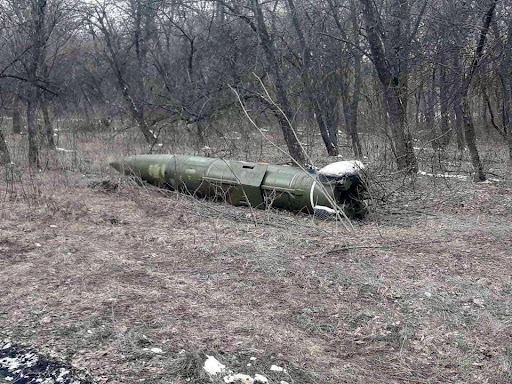
 Missile/FILE
Missile/FILEKenya’s national news has been abuzz with reports of
unsuspecting citizens being duped into seeking better jobs abroad, only to end
up in military camps in Russia, fighting against Ukraine.
While such accounts initially surfaced as unverified
reports, the matter gained national attention following the capture of Evans
Kibet, a Kenyan athlete who travelled to Russia for athletics and tourism, only
to be offered a job that led him to a military camp.
Following his surrender, Kenyan authorities reacted swiftly.
Foreign Affairs Principal Secretary Korir Sing’Oei said the government was
investigating reports that four Kenyans had been trafficked to Russia and were
currently being held as prisoners of war by Ukraine.
“Pleased to inform of rescue and repatriation of three
Kenyans — Shaquille Wambo, Pius Mwika and Derick Njaga — by our Mission in
Moscow. The three are safe and on their way home to their families. Our Mission
and teams at headquarters are doing what we can to address the situation of
those captured as prisoners of war. I thank Ambassador Peter Mathuki and the
team,”
said Sing’Oei in an update on X.
Since Kibet’s capture, the Ministry of Foreign Affairs has
confirmed the repatriation of at least four Kenyans who were illegally
recruited into the Russian army. The ministry noted that the efforts were being
coordinated by the Kenyan Mission in Moscow.
At the same time, the ministry cautioned Kenyans against
falling for fraudulent overseas job offers from unverified companies.
“We implore Kenyans to exercise all diligence in verifying
the authenticity of any foreign employment contracts and to seek advice from
the Ministry, particularly our Diaspora State Department, should they have any
doubt,”
Sing’Oei warned.
However, questions persist over how Kenyans are being drawn
into the frontline of the Russia-Ukraine war.
Reports have also surfaced about Kenyan women—alongside
others from African nations—working in Russian factories producing drones.
According to a report by the Global Initiative Against
Transnational Organized Crime (GI-TOC), at least 14 Kenyan women are among 200
young Africans employed under harsh conditions in the Alabuga Special Economic
Zone (SEZ) in Tatarstan.
The Russian Embassy in Nairobi dismissed the report, calling
it an anti-Russian narrative spread across Africa.
“Today Russia, and especially its dynamically developing
relations with Africa, has become the object of a large-scale disinformation
campaign. Western countries, realizing that their global influence is
weakening, are resorting to various, sometimes despicable, tools,”
the embassy said in a statement.
It added that Kenyan officials in Moscow were in constant
contact with representatives of Alabuga SEZ. Kenya’s ambassador to Russia, Peter
Mathuki, reportedly expressed satisfaction during one of his visits to the
facility.
While Nigeria, South Africa, and Uganda have initiated
investigations into the alleged recruitment of women to Russian factories, the Kenyan
government has yet to address the matter directly.
In South Africa, the Ministry for Women, Youth, and Persons
with Disabilities warned young people against accepting job offers in Russia.
Deputy Minister Steve Letsike said the government was engaging the Russian
Embassy in South Africa, which has denied any involvement. Investigations are
ongoing, and several influencers who promoted the jobs have since apologized.
In Nigeria, Premium Times reported that the Ministry of
Education denied any links with “Alabuga Start,” saying that job advertisements
posted on its website in 2022 and 2023 were the result of hacking and
generative AI manipulation.
Uganda’s Minister for Gender and Social Development, Betty
Amongi, confirmed a suspension of recruitment to Russia over safety concerns.
Despite these warnings, Kenya’s Ministry of Labour and
Social Protection continues to send citizens to Russia for work in food
processing factories.
On June 25, 2025, Labour Cabinet Secretary Alfred Mutua
flagged off another batch of Kenyan workers to Russia.
“They will be earning a take-home salary of Ksh115,000 a
month, with free accommodation and food provided, and will be working in a food
packing factory.
The first batch left last night and were received in Moscow by officials from
the Kenyan Embassy. Today, they will be hosted by the Kenyan Ambassador to
Russia, Hon. Amb. Peter Mathuki,”
Mutua said on X.
Exporting labour remains one of the Kenya Kwanza
administration’s job-creation strategies.
During a 2023 visit to Kenya, Russian Foreign Minister
Sergey Lavrov announced plans for a bilateral labour agreement between the two
countries. However, Kenyan Foreign Affairs officials have not confirmed whether
the agreement was ever finalized.
Meanwhile, the Russian Embassy in Nairobi has again denied
any role in recruiting Kenyans into the Russian army.
The embassy issued a statement following the arrest of
Mikhail Lyapin, who was questioned by Kenya’s Directorate of Criminal
Investigations (DCI) for allegedly running a recruitment ring.
The DCI claimed Lyapin worked for the Russian Embassy — a
claim the mission dismissed.
“Contrary to reports in some media outlets, Lyapin has never
been an employee of Russian governmental bodies and does not work at the
Russian Embassy in Nairobi,”
the embassy stated.
It acknowledged that Lyapin had been questioned by the DCI
in Nairobi but insisted it was about his private business activities, adding
that he has since left the country.


















